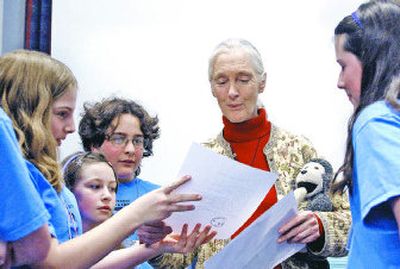Goodall shares energy with WSU

PULLMAN – Katia Rossi was in high school when she met Jane Goodall on a plane six years ago.
The famed primatologist and environmental activist handed Rossi a pamphlet for Roots & Shoots – the youth organization of the Jane Goodall Institute that supports environmental, humanitarian and animal-rights causes.
Thursday, Rossi briefly met Goodall again. Rossi is now founder and president of Washington State University’s Roots & Shoots club and hopes to someday work for Goodall’s institute. Rossi was excited and inspired Thursday afternoon by a session between Goodall and Roots & Shoots club members from around the region.
“Amazing,” she said, when asked her reaction to Goodall’s appearance. “Amazing. In such a small town, it’s going to be such an inspiration.”
Goodall’s legacy in several arenas is well-documented. Her research on chimpanzees in the 1960s revolutionized scientific knowledge about the primates, showing for the first time that the animals used tools and organized themselves in socially complex ways. The primate research she began continues at a national park in Tanzania. She also was a pioneer in science and has spent most of the last two decades traveling the world on behalf of chimps and other environmental issues, as well as humanitarian causes and peace.
But a lesser-known legacy is her institute’s worldwide network of youth organizations. Thursday in Pullman, Goodall met with scores of young people involved in Roots & Shoots clubs from Pullman, Moscow, Spokane and elsewhere in the region.
“People are always asking me, ‘Dr. Jane, where do you get your energy to travel around the world?’ ” the 72-year-old Goodall said during the gathering at the Lewis Alumni Center on the WSU campus. “I often say I get it from young people.”
Goodall met with the students during the afternoon and gave a free public lecture Thursday night.
There are more than 9,000 Roots & Shoots clubs around the world, Goodall said, working on such varied goals as trying to encourage peaceful relations between Congolese refugees and Tanzanians living around a refugee camp and educating children working in the mines of Cambodia. Thursday, groups from the Inland Northwest talked about some of their projects, which ranged from tree-planting outings to fundraisers.
Goodall said that one of the groups’ main functions is to bring together young people to overcome social or ethnic differences.
“Look at the tensions in the world with Muslims, Christians and Jews,” she said. “And yet if you get kids together from these religions, they make friends.”
Goodall also encouraged the youths to get involved with local environmental issues, as well as consider ways they can curb energy use to offset global warming.
“We actually don’t even need the lights in here,” she said, gesturing toward the large windows. “We’d all see perfectly well, once we got used to it.”
Alex Anderson, a 12-year-old from Spokane who’s part of a group formed through the Unitarian Universalist Church, was one of several students who gave presentations to Goodall about the work their clubs are doing. He’s been in the club for a couple of years, and he and his mother have watched some of the National Geographic documentaries about Goodall’s chimp research.
“I kind of like chimps,” Anderson said. “I just think it’s cool that they’re like us – they kind of look like us, but not really, and they’re exciting to watch.”
The similarities between chimps and humans were the most shocking revelation of Goodall’s research in the 1960s. Until then, scientists had assumed that chimps were primitive, simple creatures.
But Goodall essentially moved in with the chimps in a region of Tanzania – observing them very closely and discovering that the animals used tools, operated in highly complex social arrangements, and hunted and ate more meat than had been thought. At the time, Goodall had no advanced college degree and had been given the work by famed anthropologist Louis Leakey. She later earned a doctorate and is credited for inspiring a generation of female scientists to enter fields that had been practically closed to them.
“I think she’s been pioneering,” said Lisa Carloye, a biologist who teaches at WSU. “She discovered ground-breaking information about the chimpanzee, and I think that really gave a good face to women in science.”
Carloye met Goodall several years ago when Carloye was teaching at Elon University in North Carolina, and they had their photograph taken then along with Carloye’s infant son, Benjamin.
On Thursday, Goodall autographed the photo for Carloye, as she patiently posed for photographs, signed books and accepted gifts from her admirers.
At one point, as Goodall stood surrounded by admirers, somebody holding a camera said, “Say chimpanzee.”